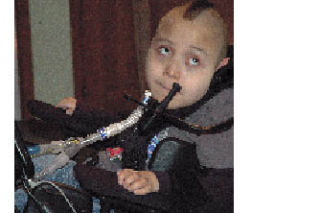Offering compassionate care in a home-like environment to “medically fragile” children is clearly a daunting task, but The Ashley House has been meeting its lofty ideals for nearly two decades.
The success story has played out quietly in rural Enumclaw and a small handful of other Puget Sound locations, but the effort hasn’t gone unnoticed an ocean away.
Staff at Enumclaw’s Ashley House recently played host to a medical group from Russia, explaining the ins and outs of making life better for children who have been dealt the toughest of breaks.
The visitors from St. Petersburg were introduced to 9-year-old Gilbert John, who suffered a fall as a toddler that left him a quadriplegic. Breathing through a vent tube installed in his throat and confined to a wheelchair, Gilbert was a hit, hamming it up by spinning circles in his wheelchair and dominating a video game in his spacious bedroom.
Gilbert gets around and enjoys his games by using headgear equipped with a plastic mouthpiece.
The Russian guests also met Cianna, a 3-year-old who is in a coma, the result of a birth defect. A guide explained, through an interpreter, that Cianna receives physical therapy and is read to.
She and Gilbert are two of the five children living at Ashley House, which sits on seven peaceful acres just north of Southeast 416th Street on 236th Avenue Southeast.
The idea that eventually became Ashley House first stirred in 1987 in the mind of social worker Michael Straub. He knew certain opportunities existed for kids with disabilities, but wanted something more. He became an activist and started the wheels turning that produced a task force; that group suggested legislation that was ultimately supported by then-Gov. Booth Gardner.
One of the members of that task force was Mike Pugsley, who joined Ashley House and continues to serve as program director. During the visit by the Russian delegation – which included two doctors and an administrator – Pugsley served as guide and historian, explaining the Ashley House operation from top to bottom, from bookkeeping to nursing care and everything in between.
He noted that a nurse and an aide are on duty 24 hours a day, seven days a week.
He and Bruce Brandler, who came to Ashley House as executive director just a few months ago, also explained that Ashley House is, ideally, a temporary stop. In a perfect world, both said, kids eventually are able to return home or can be placed in foster care.
Seattle’s Peter Anderson accompanied the Russian group and explained how the delegation happened to make their way to Enumclaw. It seems there’s a Russian Orthodox priest, Father Alexander, who initiated a care program that has grown to serve approximately 200 children in St. Petersburg. Alexander is behind the effort to develop an independent facility to care for children with advanced medical needs and, through connections with Seattle’s Children’s Hospital, the delegation learned of Ashley House and asked to visit and ask pertinent questions.
The Enumclaw facility occupies a former home that measures 10,000 square feet and houses administrative offices for the entire Ashley House operation. Aside from Enumclaw, there are facilities in Kent, Olympia and Tacoma, and a fifth home is on the way, ready to open in Federal Way. The others are about one-fourth the size of the Enumclaw facility. Currently, 25 children reside in the four homes.
Most of Ashley House’s $4 million annual budget is met by funding through the state’s Department of Social and Health Services.
Reach Kevin Hanson at khanson@courierherald.com.


